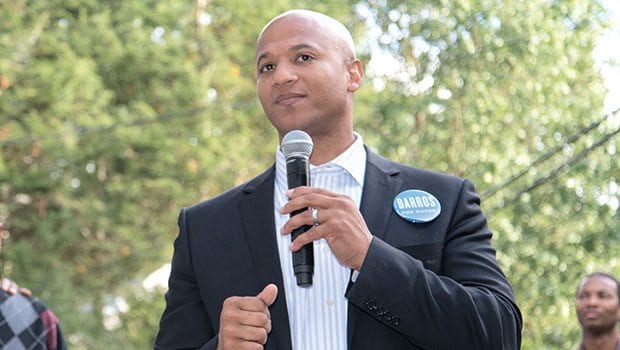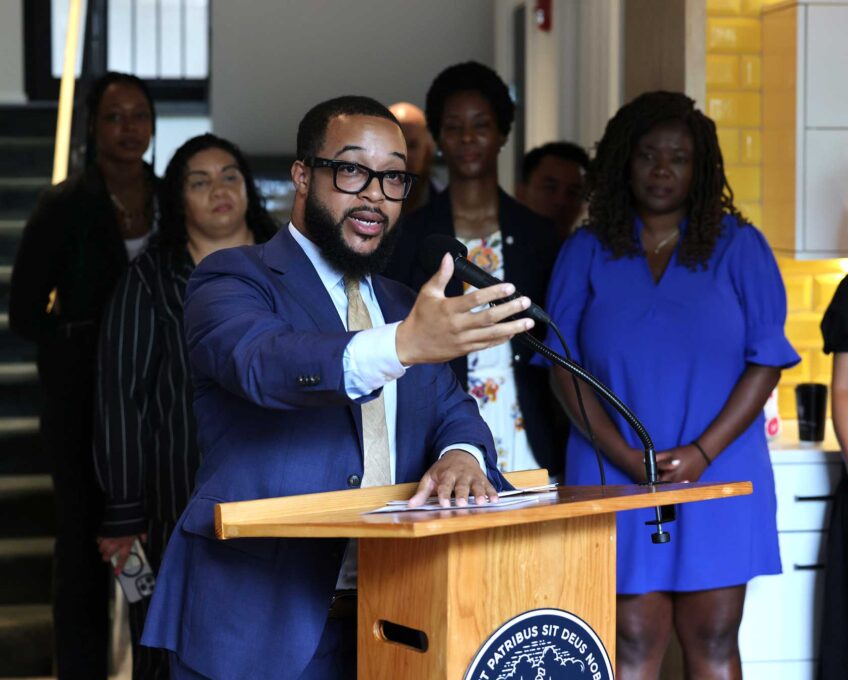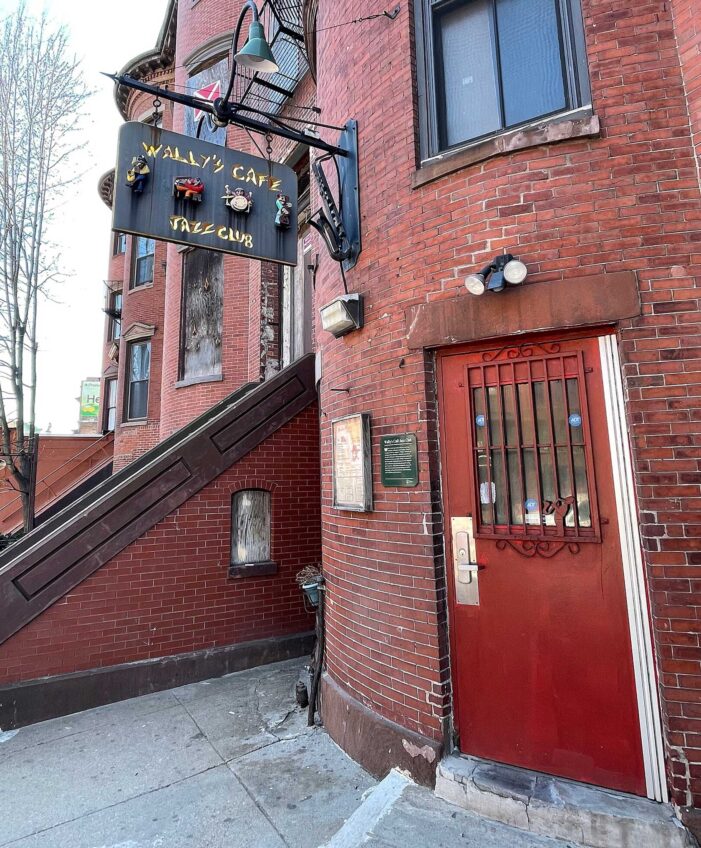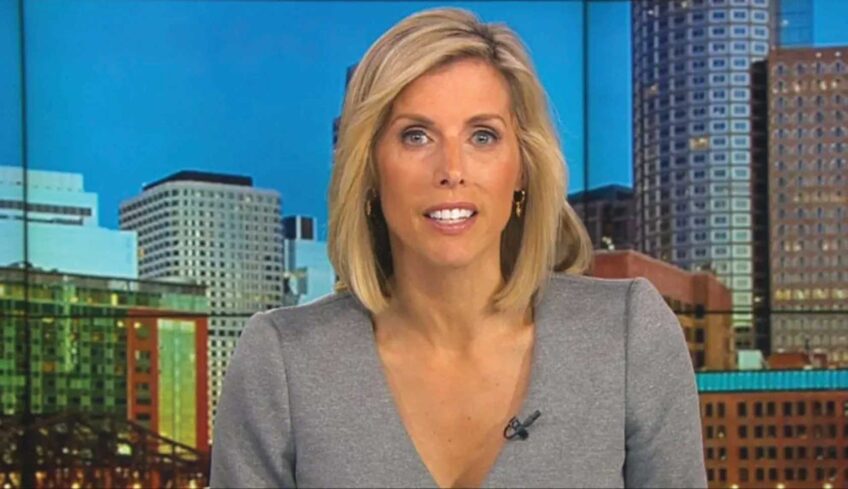
For John Barros, it was not a very long trip from Roxbury to an executive office in City Hall where he serves as the first Chief of Economic Development in the history of Boston. Now he can implement across the city some of the concepts he developed in the Dudley Street Neighborhood Initiative.
According to Barros, “It’s the opportunity for us to coordinate all economic activities and make sure we are driving certain policies, particularly the policy around economic equity … to make sure our economic prosperity in the city of Boston is working for everyone, for every neighborhood.”
His top priorities are economic equity, neighborhood development and most importantly, innovation. To accomplish these objectives, the new Economic Development Chief oversees the Boston Redevelopment Authority, the recently created office of Financial Empowerment and he also meets with community groups and individuals to discuss neighborhood building. Barros says his message is ‘Boston is open for business’ and the city is open minded about the future of the city’s economy.
“You should see the city as a partner. This is your city government, these are your programs these are your resources,” Barros said.
His biggest responsibility and biggest challenge is the BRA. While the Economic Development Chief does not oversee the day to day operations, that is the job of the Executive Director, he does shape the culture and the climate. Barros says he wants the agency to be a catalyst for economic opportunity. Good examples are the incentives for minority ownership and minority contractors that are part of the request for proposals to build a 1000 room hotel at the Boston Convention and Exhibition Center.
“That’s the kind of model that we are going to be doing, making sure women-owned, minority-owned businesses are thriving in Boston, making sure the city has a friendlier contracting process, a friendlier procurement process, and that we are making opportunities so they can grow,” Barros said.
Appointed by Mayor Marty Walsh in February of 2014, he’s spent the last year turning this new cabinet level office into a hub for people and companies who want to help the economy grow in the “Hub.”
The 41-year-old son of Cape Verdean immigrants, Barros was born and raised in Roxbury and now lives with his wife and kids in the Uphams Corner section of Dorchester. He earned a B.A. in African Studies from Dartmouth University and a Masters in Public Policy from Tufts University. He began his career in the corporate world, working at the Chubb Group of Insurance Companies and then he took his skills to the non-profit world as the Executive Director of the Dudley Street Neighborhood Initiative. It’s a story the Economic Development Chief hopes will resonate with people in neighborhoods like Roxbury and Dorchester and help bridge the gap between them and city government.
“When you have city leadership that looks like the city of Boston, which is diverse and becoming more and more diverse, you need leadership that is accessible and you feel like you can approach it, you feel like you can have a conversation,” Barros said.
‘Innovation economy’
That connection with the neighborhood will be crucial, he believes, as he tries to bring Roxbury and Dorchester into what he calls “the innovation economy.” The Seaport and its identity as a tech center is a model that other neighborhoods can emulate.
“The reason I’m excited to work with Mayor Walsh is that he gets that. He understands that all of our neighborhoods need to continue to be strong so Boston can be strong.” Barros says, “So we’re not taking our eye off of downtown Seaport. But we are making sure that we put more attention on Dorchester, Roxbury and some of the other neighborhoods to make sure they are growing as the city is growing. We want all neighborhoods to benefit from the innovation economy in Boston. That is not just something happening in the Seaport, that needs to happen particularly in minority neighborhoods. We need to look at how we can replicate some of the successes at the Seaport, think about how neighborhoods are special in their own right and what we can build on so they are innovating around fashion or they are innovating around food or they are innovating around arts and culture because innovation isn’t just about technology.”
Barros points to Roxbury Technology as an example of neighborhood innovation. The Hyde Park company produces re-manufactured toner cartridges for printers. He believes that promoting and incentivizing manufacturing is a top priority. “We think that is a new direction for growth in our economy. We should have entrepreneurs looking for ways to create those opportunities and innovating ways to make those products.”
Barros also sees potential in a burgeoning tech sector related to the edX platform created by MIT and Harvard University. “There is a whole community of edX software developers in Boston, who are creating software, platforms and different tools that can be used in the classroom or schools. It’s all over the city. It was a pleasure to meet a lot of entrepreneurs of color.”
Restaurant industry
Another area of focus will be the restaurant industry especially in Roxbury and Dorchester. Barros knows how difficult the industry can be. He also views restaurants as an igniter of the “innovation economy.”
“I have a personal passion around the restaurant business.” Barros said, “I’d like to see more full service restaurants in minority communities. They are a really important part of the main street areas of our communities. They are the infrastructure for people getting together to exchange ideas, starting businesses, having the neighborhood businesses we need to have and finding partnership to do something.” Barros was a founder of Restaurante Cesaria, a Cape Verdean restaurant.
Seeing the link between grassroots and hi-tech is something Barros says he honed during his time as Executive Director of the DSNI.
“DSNI gave me the kind of experience that was holistic in understanding economic development.” Barros said, “It gave me 13 years of working with people in the neighborhood to help create the kind of plan that would build a local economy and infrastructure in the neighborhood we all lived in, dealing with different city agencies including the BRA, trying to plan out the neighborhood and implement that plan. I had experience using different tax tools to put the deals together, had experience putting deals together with diverse financing sources, experience using municipal tools like eminent domain, it provided me the opportunity to understand the challenges of small businesses in our neighborhoods and how to help them out. We worked on transportation issues; we worked on green space and environmental sustainability issues, jobs creation, workforce development especially around youth.”
Talking it through
Barros says he’s met with the NAACP, community groups and individuals about jobs, housing and business development. But his goal is to create an environment where entrepreneurs are seeking his office because it’s worth their time and energy.
“People need to come with those ideas. They need to come back with their business plans. They don’t have to be 100 percent ready. Let’s talk concept, let’s talk about what you want to do and then let’s figure out how we can meet each other,” Barros said. “Let’s talk about how we can bring some technical assistance. We’ll talk about permitting; we’ll talk about if you might need some additional capital for what you are trying to do.”
These are long term goals and a long term commitment by Barros. With plans to stay on as Chief of Economic Development at least through Mayor Walsh’s first term, Barros hopes to see many Boston based businesses from start to success.

This article appeared in the March issue of Banner Biz.
To read the full issue click here






